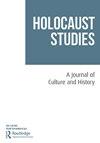Kingdom of Night: witnesses to the Holocaust
IF 1
Q1 Arts and Humanities
引用次数: 0
Abstract
wonderfully picked up in Hilene Flanzbaum’s essay that closes this volume and simultaneously serves as an outlook. Her article carefully addresses the perpetual ebbing and flowing in academia, demonstrating how Holocaust studies initially provided the nurturing ground for trauma studies, only to be relegated to one amongst many topics that contemporary academic discourse addresses under the rubric of traumatizing social and personal ills. Flanzbaum not only ends this impressive collection of essays on a note of calm reflection, she furthermore adds an impressively comprehensive angle in her closing thoughts. The very diversity to which this edited book testifies in every way now requires, maybe more than ever, notions and ideas that provide coherency to a field of research that is tied together at times primarily by its shared object of interest. Transand interdisciplinary research already features prominently in a range of contributions to this book, and the editors are to be applauded for providing space for such endeavors. To single out one such article, Naomi Sikoloff’s essay on ‘The Nazi Beast at the Warsaw Zoo’ brings together animal studies, ethics, dehumanization and a range of other relevant and fascinating aspects in her discussion of the memoirs written by the zookeeper’s wife, of Diane Ackerman’s novel based on her life and of the cinematic adaption based on this literary material. The careful readings are then related to David Grossman’s See Under Love, with further connections followed into J.M. Coetzee’s writing. While committed to close and insightful commentary on her chosen literary sources, the article makes a compelling case for the kind of productive engagement that Holocaust Studies scholars can engage in as they demonstrate the relevancy of their own expertise in related research fields. Readers of this handbook will find many such moments throughout this wonderful volume.夜之王国:大屠杀的见证人
本文章由计算机程序翻译,如有差异,请以英文原文为准。
求助全文
约1分钟内获得全文
求助全文

 求助内容:
求助内容: 应助结果提醒方式:
应助结果提醒方式:


